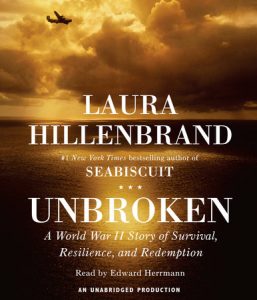Recently in my Humanities class I have been learning all about World War II. As one of the main tasks of the course I had to pick a book based in the time period of the war and read it. I had a couple of different choices to pick from and after some research I chose Unbroken by Laura Hillenbrand. I chose this book because I personally thought it sounded the most interesting out of the few. An amazing non fictional story of a heroic American soldier fighting for his life throughout the war, what’s not to like? I loved the book and I’m really glad I read it: the way the characters change and evolve got me really interested into the plot. Below is a review I wrote on unbroken, I hope you enjoy!

Unbroken: A World War II Story of Survival, Resilience, and Redemption
By: Laura Hillenbrand
In her book Unbroken, Laura Hillenbrand tells a remarkable story of courage, strength and forgiveness. In 1936 Louis Zamperini was a 19-year old American champion runner (and former juvenile delinquent) competing in the Berlin Olympics. Five years later he enlisted as a bombardier in the American Air Force, but after just two years his plane crashed in the Pacific Ocean while on a search and rescue mission.
Out of 11 crew members, only Zamperini and two others survived the crash. They drifted in the ocean on a crude life raft with only a little water and some chocolate. After a few days one of the other crew members ate all of the chocolate, but Zamperini showed grace and forgave his mate, who later redeemed himself by fighting off an attacking shark. Unfortunately that crew member died after a month at sea. A couple of weeks later, Zamperini and his pilot reached the Marshall Islands and were captured by Japanese soldiers, who sent them to the first of several P.O.W. camps.

Picture from the Unbroken movie.
At the P.O.W. camps Zamperini was tortured physically and mentally by his captors and was specifically picked on by one evil, insane man nicknamed “The Bird”. The Japanese knew that he was a champion runner, and they used his captivity for propaganda. In order to get more food and better living quarters, Zamperini made a propaganda broadcast for his captors, and since he was allowed to say anything he wanted, he agreed. This radio broadcast was how his family found out he was alive and captured by the Japanese, and this gave them hope that he would return to them. He was asked to do a second broadcast, but this time he had to read an anti-US script, so he refused out of loyalty to his country. Zamperini was then sent back to the Omari Prisoner of War Camp, where he met up with his torturer “The Bird”.
“The Bird” was obsessed with Zamperini and tortured him constantly for two years. At the camps, “the guards sought to deprive them of something that had sustained them even as all else had been lost: dignity. This self-respect and sense of self-worth, the innermost armament of the soul, lies at the heart of humanness; to be deprived of it is to be dehumanized, to be cleaved from, and cast below, mankind.” Many men would have broken down or even died, but Zamperini was able to draw on an inner strength to survive his ordeal.

Picture from the Unbroken movie.
Louis Zamperini was rescued in September 1945 and received a hero’s welcome when he returned home. He married and had children, but his experiences during the war haunted him and he became an alcoholic: “All I did was pray to God, every day. In prison camp, the main prayer was, ‘Get me home alive, God, and I’ll seek you and serve you.’ I came home, got wrapped up in the celebration, and forgot about the hundreds of promises I’d made to God.” His wife took him to one of Billy Graham’s Christian Revivalist meetings, and he became a born-again Christian. At that moment, he forgave his captors and was able to overcome his PTSD. “Hate is self-destructive. If you hate somebody, you’re not hurting the person you hate. You’re hurting yourself. And that’s a healing. Actually, it’s a real healing, forgiveness.”
Zamperini eventually returned to the Japanese P.O.W. camp to seek out his captors in order to forgive them. There he learned that “The Bird” was not present and had likely committed suicide. The realization that his tormentor had himself become so tormented affected Zamperini deeply. “At that moment, something shifted sweetly inside him. It was forgiveness, beautiful and effortless and complete. For Louie Zamperini, the war was over.”
The portrayal of Zamperini as a Western war hero with amazing courage and strength reminds me of Albert in War Horse by Michael Morpurgo. Albert was also a young soldier and endured terrible things in war, yet is able to return home a hero. Both stories deal with young men who are traumatized by the realities of war, and they paint vivid pictures of the horrors of war and the unspeakably cruel things men are willing to do to one another. These scenes of war were brought to life in the movie Dunkirk, where again young soldiers are forced to endure horrendous conditions while remaining strong and brave. Zamperini is a real man, and his story is real, and it is humbling to realize the debt that the modern world owes to all those who fought in the Great Wars. Laura Hillenbrand’s book tells this powerful story vividly, and it is an exciting read.

April 30, 2018 at 5:24 pm
This blog post has a great intro and I really enjoyed your book review. The book review is really text heavy so it would be nice if you could add pictures or split up the paragraphs. -Hannah Bontinen